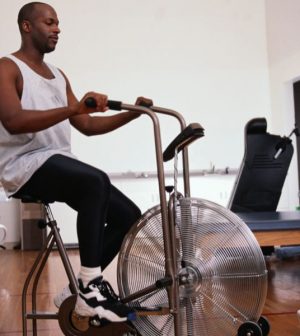- Could Your Grocery Store Meat Be Causing Recurring UTIs?
- Are You Making This Expensive Thermostat Error This Winter?
- Recognizing the Signs of Hypothyroidism
- 10 Strategies to Overcome Insomnia
- Could Artificial Sweeteners Be Aging the Brain Faster?
- Techniques for Soothing Your Nervous System
- Does the Water in Your House Smell Funny? Here’s Why
- Can a Daily Dose of Apple Cider Vinegar Actually Aid Weight Loss?
- 6 Health Beverages That Can Actually Spike Your Blood Sugar
- Treatment Options for Social Anxiety Disorder
Exercise Caution to Protect Your Skin at the Gym

If you pledged to hit the gym this year, take some steps to prevent skin infections, an expert says.
“While skin infections are not a reason to cancel your gym membership, it’s important to follow a few simple steps to avoid germs while you’re at the gym,” said Dr. Brian Burke Adams, professor and chair of dermatology at the University of Cincinnati.
“The bacteria, viruses and fungi that cause skin infections to develop thrive in warm, moist places like sweaty exercise equipment and locker room showers. If you’re not careful, you could end up with an infection like ringworm, plantar warts or impetigo,” he said in an American Academy of Dermatology news release.
Here’s what Adams recommends:
- At the gym, wear loose-fitting, moisture-wicking clothes that will help keep your skin dry and prevent germs from growing. Wash your gym clothes after a workout.
- Always wear shoes, especially around pools, and in locker rooms and showers. Keep shower shoes, flip-flops or sandals in your gym bag.
- If you have cuts, keep them clean and covered. Don’t use saunas, steam rooms or hot tubs until the wound is healed, Adams said.
- Wash or sanitize your hands immediately after working out, and shower as soon as possible. After showering, put on clean clothes, including clean socks and underwear. Never share towels, razors or other personal items.
- Use disinfectant wipes or sprays to clean gym equipment before and after you use it. It’s also a good idea to place a barrier, such as a towel, between your skin and shared surfaces such as workout benches and bicycle seats. Use your own equipment, such as yoga mats, when possible.
“Without treatment, skin infections can worsen,” Adams said. “Keep an eye on your skin, and if you notice signs of an infection, such as increased pain or swelling, pus or persistent redness, make an appointment to see a board-certified dermatologist.”
More information
The U.S. National Library of Medicine has more on skin infections.
Source: HealthDay
Copyright © 2026 HealthDay. All rights reserved.










